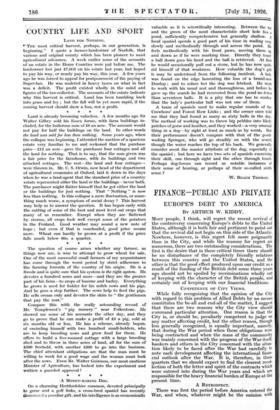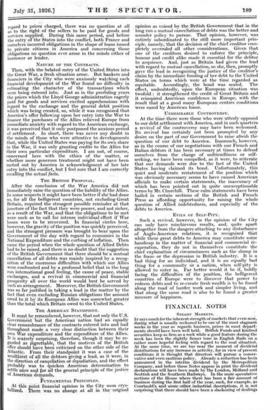FINANCE-PUBLIC AND PRIVATE
EUROPE'S DEBT TO AMERICA
BY ARTHUR W. KIDDY.
MOST -people, I think, will regret the recent revival of the controversy concerning Europe's debts to the United States, although it is both fair and pertinent to point out that the revival did not begin on this side of the Atlantic. Nowhere, however, is this regret felt more poignantly than in the City, and while the reasons for regret are numerous, there are two outstanding considerations. The first is the desire that in these critical times there should be no disturbance of the completely friendly relations between this country and the United States, and the other is that the good effect produced upon our credit as a result of the funding of the British debt some three years ago should not be spoiled by recriminations wholly out of keeping with the character of the British people, and certainly out of keeping with our financial traditions.
COMPETENCE OF CITY VIEWS.
While fully recognizing that the opinion of the City With regard to this problem of Allied Debts by no means constitutes the be-all and end-all of the matter, I suggest that there are two reasons why the City view should command particular attention. One reason is that the City is, or should be, peculiarly competent to judge on any matter affecting credit, but the other reason, though less generally recognized, is equally important, namely, that during the War period when these obligations were being contracted and when the mass of the community was mainly concerned with the progress of the War itself, bankers and others in the City concerned with the situa. tion likely to be faced after the War had carefully to note each development 'affecting the international &tan• cial outlook after the War. It is, therefore, in these quarters that we should expect to find the clearest recol- lection of both the letter and spirit of the contracts which were entered into during the War years and which are responsible for the heavy financial burden of Europe at the present time. A RETROSPECT.
There was first the period before America entered the War, and when; whatever might be the opinion with regard to prices charged, there was no question at all as to the right of the sellers to be paid for goods. and services supplied. During this same period, and before the entry of the'States into the conflict, both France and ourselves incurred obligations in the shape of loans issued to private citizens in America and concerning those obligations no question ever arose in the minds either of borrower or lender.
NATURE OF THE CONTRACTS. •
Then, with the belated entry of .the United, States into the Great War, a fresh situation arose. But bankers and financiers in the City who were anxiously watching each financial development 'of the War found no difficulty in estimating .the character of the transactions which were being entered into. Just as in the preeeding years the prices which the Lloyd George administration eagerly paid for goods and services excited apprehensions with regard to the exchange and the general debit position which was being created, so, while it was recognized that America's offer following upon her entry into the War to finance the -purchases of the Allies relieved Europe from immediate anxiety with regard to the American exchange, it was perceived that it only postponed the anxious period of settlement. In short, there was never any doubt in the minds of those who were attentive to developments that, while the United States was paying for its own share in the War, it was only granting credits to the Allies for their own particular expenditure. I am not, of course, concerned here with the ethics of the matter, or whether more generous treatment might not have been meted out by America in acknowledgment of her late entry into the. conflict,but I feel sure that I am correctly recalling the actual facts.
THE BRITISH PROPOSAL.
After the conclusion of the War America did not immediately raise the question of the liability of the Allies. In some respects it might have been better if she had done so, for all the belligerent countries, not excluding Great Britain, required the strongest possible reminder at that juncture of the fact that they were poorer, and not richer, as a result of the War, and that the obligations to be met were such as to call for intense individual effort if War losses were to be recovered. In financial circles here, however, the gravity of the position was quickly perceived, and the strongest pressure was brought to bear. upon the Government of the day with regard to economies in the National Expenditure and the curbing of inflation. Then came the period when the whole question of Allied Debts had to be raised, and there is no doubt that the suggestion of the British Government that there should be .a mutual cancellation of all debts was mainly inspired by a recog- nition of the enormous difficulties with which our Allies were confronted and by a profound belief that in the long run international good feeling, the cause of peace, stable exchanges, and a revival in commercial and financial prosperity all over the world would best be served by such an arrangement. Moreover, the British Government was so far justified in taking a lead in the matter by the fact that even excluding Russian obligations the amount owed to it by its European Allies was somewhat greater than the total which Britain owed to the United States.
THE AMERICAN STANDPOINT.
It must be remembered, however, that not only the U.S. Goverrinient -bit- flie Anieribaii- nation had-an equally clear remembrance of the contracts entered into and had throughout made a very clear distinction between their own War expenditure and the expenditure -of the Allies. It is scarcely surprising, therefore, though it may be re- garded as regrettable, that the motives of the British offer should have been criticized on the other side of the Atlantic. From their standpoint it was a case of the Wealthiest of all the debtors giving a -lead, as it were; in the direction of cancellation or repudiation, and the effect Probably was to quicken American determination to settle once and for all the general .principle of the justice of American demands.
/4UNDAMENTAL PRINCIPLES.
At this Point financial opinion in the City soon crys- tallized. There was no change at all in the--original opinion as voiced by -the -British Government' that in the long run a mutual cancellation of debts was the better and sounder policy to pursue. That opinion, however, was entirely subordinated to the . still more important prin- Ciple, namely,- that the decision of the chief creditor com- pletely overruled all other considerations. Given that one of the creditors desired to enforce the principle, honour and credit alike made it essential for the debtor to acquiesce. And, just as Britain had given the lead with regard to mutual cancellation, so she, then, promptly gave the lead in recognizing the justice 'of the creditor's claim by the immediate funding of her debt to the United States on terms which were at the time regarded as equitable. Accordingly, the bond was sealed. The effect, undoubtedly, upon the European situation was twofold : it strengthened the credit of Great Britain and it reinspired American confidence in' Europe, with the result that at a good many European centres conditions were eased by American loans.
UNDESIRABLE CONTROVERSY.
At the time there were those who were utterly opposed to our deht settlement with America, and in such 'quarters a revival of the controversy may have been welcomed. Its revival has certainly not been prompted by any desire on the part of our Government to raise afresh the question of our debt to America. Inasmuch, however, as in the course of our negotiations with our French and Italian debtors it has been necessary at times to defend ourselves from the charge of unfriendliness or self- seeking, we have been compelled, as it were, to reiterate that our demands were due to the 'fact of the United States having claimed its bond. Unfortunately, this quiet and moderate. restatement of the position which was obviously necessary seems to have caused American officials to make certain statements, the inaccuracy of which has been pointed out in quite unexceptionable terms by Mr. Churchill. These calm statements have been hailed in certain sections of the British and French Press as affording opportunity for raising the whole question of Allied indebtedness, and especially of the debts to America.
EVILS OF SELF-PITY.
Such a revival, however, in the opinion of the City can only have mischievous results, and, quite apart altogether from the dangers attaching to any disturbance of Anglo-American relations, it is recognized that while these great debts to America may constitute some handicap in the, matter of financial and commercial re- cuperation, they do not in themselves constitute the chief explanation of circumstances such as the slump .in the franc or the depression in British industry. It is a bad thing for an individual, _and. it is an equally bad thing for a community Or a nation, when self-pity is allowed to enter in. Far better would it be if, boldly facing the difficulties of the position, the belligerent countries of Europe were to discover that power to redeem debts and to re-create fresh wealth is to be found along the road' of harder work and 'simpler living, and that along the same road is also to be found a greater measure of happiness.



































 Previous page
Previous page